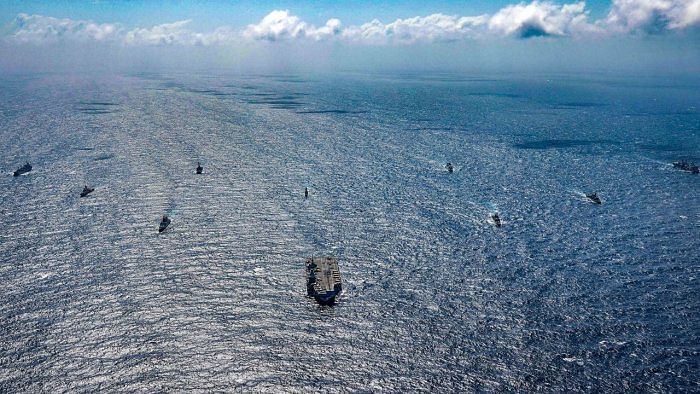

The Indian Ocean has a pivotal role in the Indo- Pacific concept. India and Japan among the Quad countries are interested in the Indian Ocean between India and Africa. France has a hold in the southern Indian Ocean through Reunion, Mayotte and its traditional relations with Madagascar and Comoros.
India has a long-standing relationship with Mauritius and Seychelles as important partners with large Indian diasporas. Sri Lanka and Maldives are India’s neighbours. Now, India also sees the Indian Ocean islands of Mauritius, Seychelles, Madagascar and Comoros as part of its neighbourhood.
Read | The scramble for sea power
Rising trade and commerce provided an impetus for relations with these island countries. They are facilitators due to their locations as India diversified its energy basket. More energy supplies come from West Africa. New investments in Mozambique will add to the strategic value of the Mozambique Channel. This is an important choke point for India, as well as for other countries in Asia, which also import oil and other resources from Western Africa.
India always prioritized the security concerns of Seychelles and Mauritius as it moved to deepen its relationships with the two Indian Ocean nations. The same approach is being pursued for Madagascar and Mozambique too.
Many of these concerns are non-traditional threats, dealing with humanitarian aid and disaster response, counterterrorism, illegal migration and piracy. India has been an effective partner to build the coast guard and naval capabilities of the Indian Ocean nations. With France, which has influence in Madagascar and Comoros and owns the Reunion Island, India has a strong partnership in the Indian Ocean.
India does not need to enter into a competition with China on setting up bases. These require deep pockets and are development multipliers for the local hosts. The Chinese base in Djibouti does not follow this model. Indian offers of developing Agaléga and Assumption islands in Mauritius and Seychelles are essentially development models in strategic places in the Indian Ocean which could deal with non-traditional threats. Denying access to China would be enough.
Secondly, India and France are enhancing their cooperation, with mutually beneficial agreements and access to each other’s facilities. This provides India access to facilities in Djibouti and Reunion. The same goes for Japan and the US whose facilities in Djibouti are available. Through this network of partnerships, India has adequate facilities for its navy to be serviced while on long term deployment in the western and eastern Indian Ocean.
No doubt the development of these islands is important; equally important is the stability and security of Mozambique, which is often overlooked. India’s role in supporting Mozambique where large FDI is afoot are praiseworthy.
India should not get carried away by the diaspora aspects of Seychelles and Mauritius. Adequate investment in these is on record. The law of diminishing returns is perhaps setting in. Strategically, India should look beyond the diaspora aspect and deal with them in a transactional manner, much as everybody else is doing.
India can revive the IBSA (India, Brazil and South Africa) within the BRICS (Brazil, Russia, India, China and South Africa) to challenge China’s dominance.
(The writer is India’s former ambassador to Germany, Indonesia, Ethiopia ASEAN and the African Union. He recently authored “The Harambee Factor: India Africa Economic and Development partnership”.)